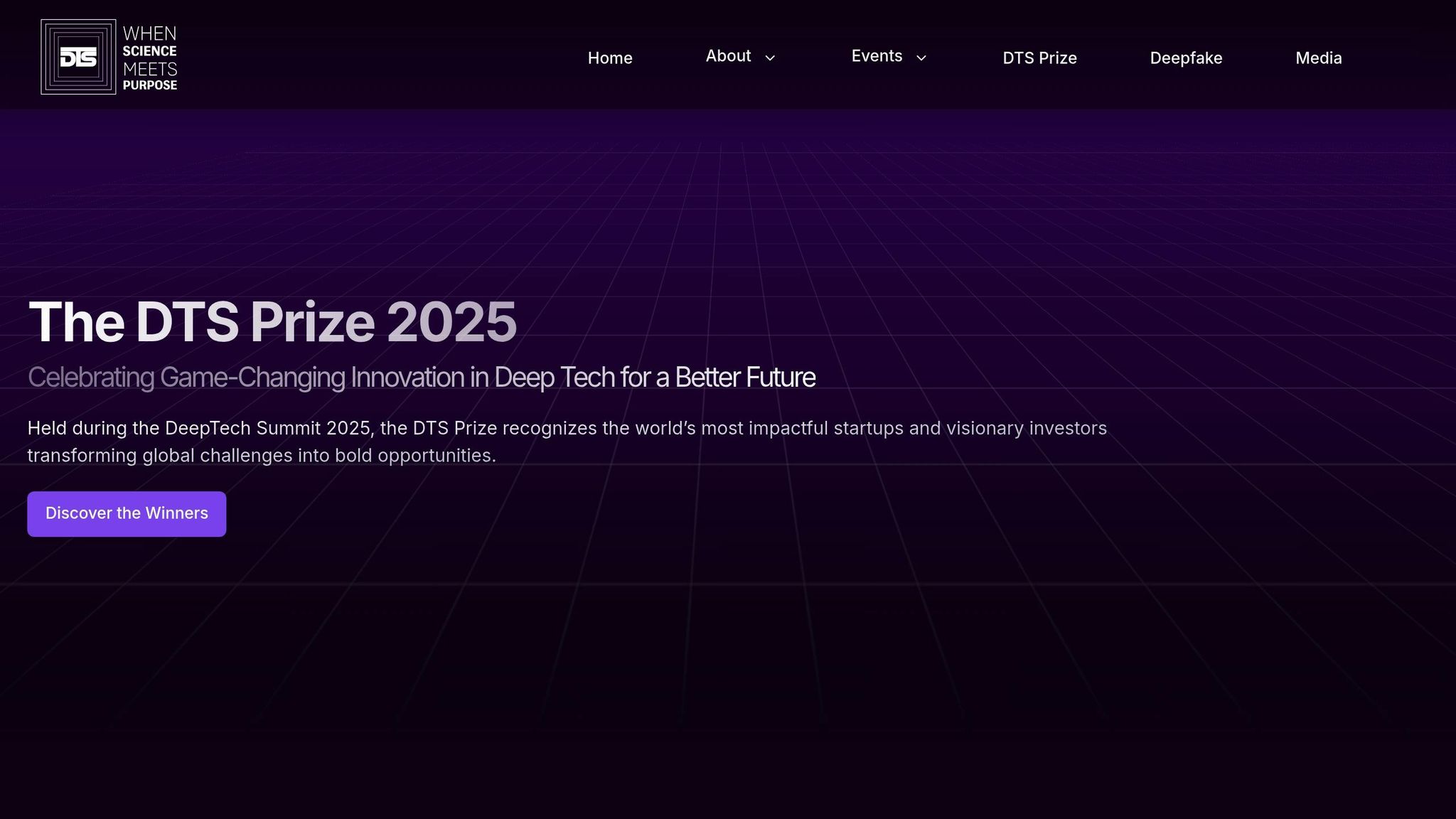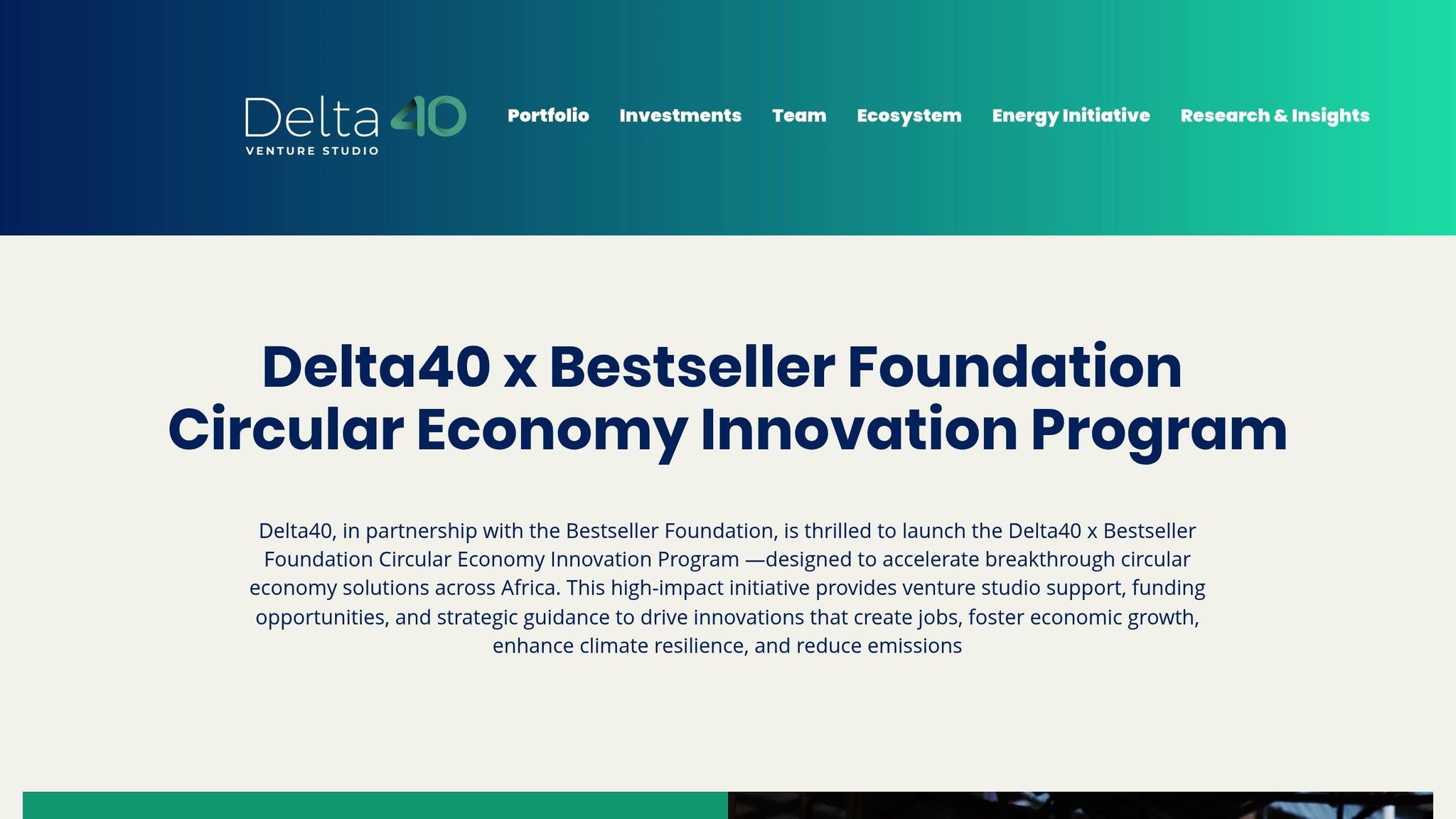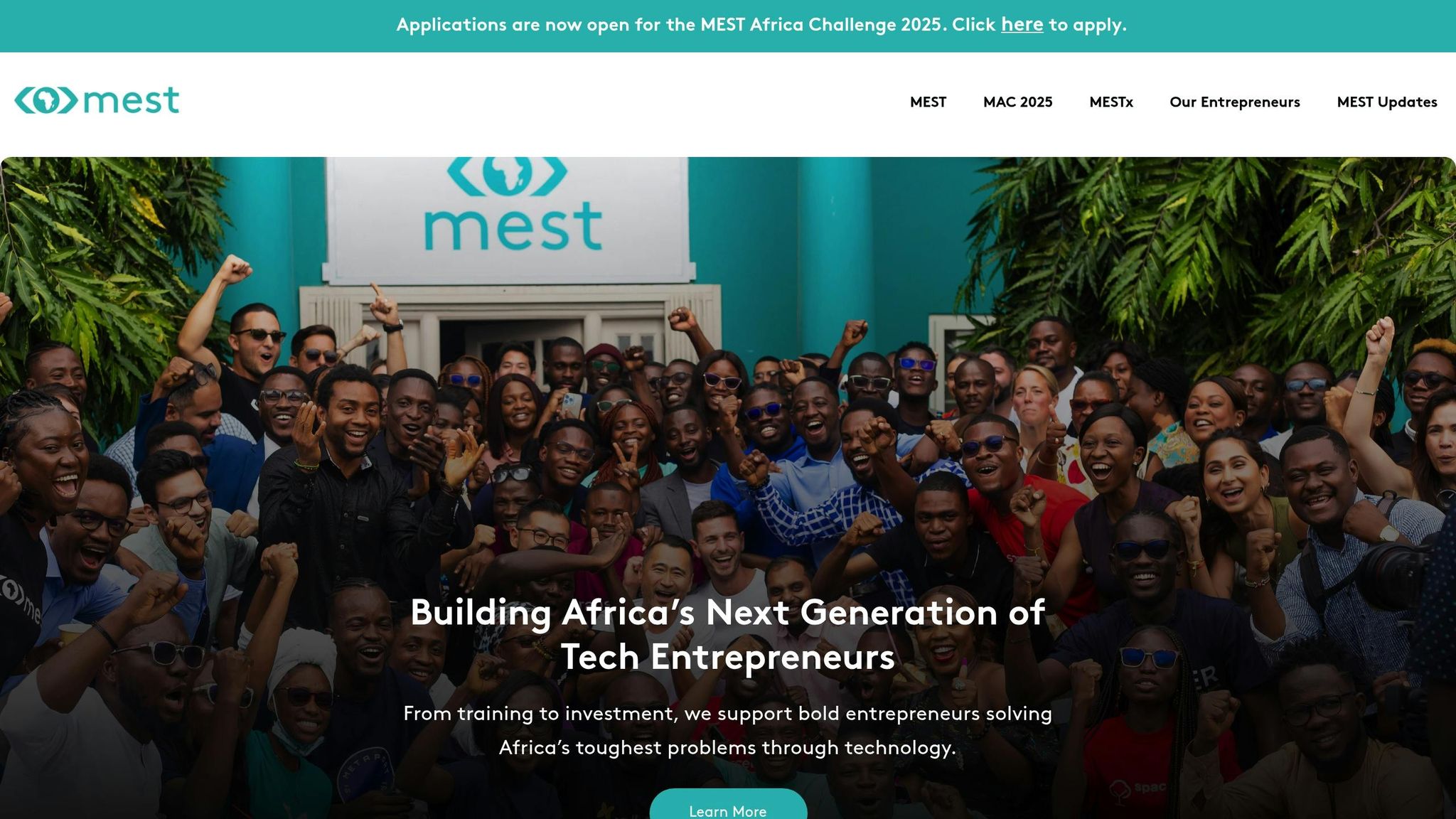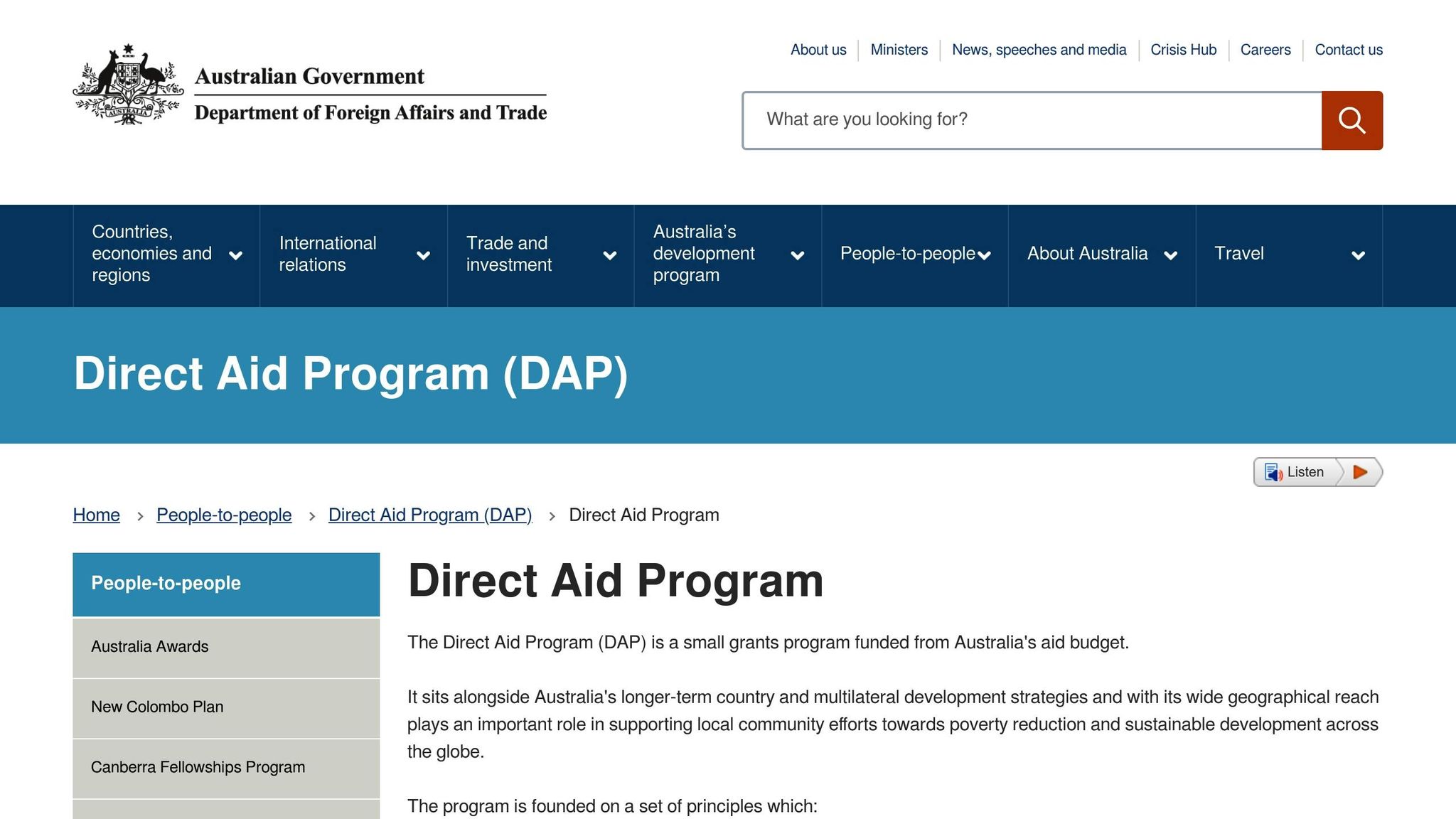Africa’s startup scene is growing fast, but funding remains a challenge. Government grants and funding programs are stepping in to provide non-repayable financial support, helping entrepreneurs grow without giving up ownership. These programs also offer mentorship, training, and market access to help startups succeed. Here’s a quick look at five key funding options available to African startups:
- DTS Prize: $50,000 cash prizes for deep-tech startups in the Green Economy and Life Sciences sectors.
- Delta40 Venture Studio x BESTSELLER FOUNDATION: $25,000–$250,000 for businesses in the circular economy.
- MEST AI Startup Program: Up to $100,000 for West African AI-driven startups.
- SARA BY WEMA: Grants up to ₦2,500,000 (~$1,600) for Nigerian youth-led businesses.
- Australian High Commission DAP: $5,000–$30,000 for community-focused projects in education, healthcare, and agriculture.
These programs address diverse sectors, from AI and sustainability to youth empowerment, making them valuable resources for startups across the continent.
Where to Get Tech Startup Funding in South Africa | NYDA, SEDA | AWS 2025 SUMMIT
Quick Comparison
| Program | Funding Amount (USD) | Regions | Sectors |
|---|---|---|---|
| DTS Prize | $50,000 | Africa-wide | Green Economy, Life Sciences |
| Delta40 Venture Studio | $25,000–$250,000 | Sub-Saharan | Circular Economy |
| MEST AI Startup Program | Up to $100,000 | West Africa | AI, Agriculture, Healthcare, Education |
| SARA BY WEMA | Up to $1,600 | Nigeria | MSMEs, Youth Empowerment |
| Australian High Commission DAP | $5,000–$30,000 | Africa-wide | Education, Healthcare, Agriculture, Women |
These grants are helping startups overcome funding hurdles, create jobs, and drive innovation across Africa. If you’re an entrepreneur, this is your chance to secure funding tailored to your needs.

The DTS Prize is a global competition that celebrates deep-tech startups making a big impact. As part of the DTS 2025 event, it offers winners cash prizes and access to a supportive ecosystem, helping them scale their innovations.
What makes this prize especially exciting for African entrepreneurs is its dedicated category recognizing the continent’s most promising startups. In May 2025, several African startups made it to the finals. Among them were Nigeria’s EpochZero, Mauritania’s Typhinity RIM, and Kenya’s NYUNGU AFRIKA, all competing in the “Most Promising African Startups” category. Additionally, Tunisia’s Cure Bionics was a finalist in the Life Sciences category, while Sand to Green, a Morocco/France collaboration, competed in the Green Economy category.
Funding Amount
The DTS Prize awards two cash prizes of $50,000 each. One is reserved for the Best Deep-Tech Startup in the Green Economy, while the other goes to the Best Deep-Tech Startup in Life Sciences.
Eligibility Criteria
The competition focuses on early-stage deep-tech startups that stand out for their technological breakthroughs, market potential, strong teams, and transformative impact.
Application Process
The selection process for the DTS Prize is thorough and unfolds in three phases:
- Phase 1: Applications are reviewed to narrow the pool to the top 60 startups.
- Phase 2: A panel of global experts evaluates these startups and selects 9 finalists.
- Phase 3: The winners are announced at DTS 2025, including one for the “Most Promising African Startup” category.
Finalists don’t just compete for cash prizes – they also gain invaluable media coverage, exclusive access to the DTS ecosystem, and full logistical support to attend the event. This multi-step process underscores the competition’s dedication to recognizing startups with both innovative ideas and market readiness.
Target Sectors or Industries
The DTS Prize focuses on two key sectors:
- Green Economy: Innovations in environmental sustainability, climate change solutions, and renewable energy.
- Life Sciences: Advancements in healthcare, biotechnology, and medical devices.

Delta40 Venture Studio, in collaboration with BESTSELLER FOUNDATION, runs a program designed to support African entrepreneurs who are tackling challenges within the circular economy. This initiative offers funding opportunities for ventures at different stages – whether they’re just starting out or already scaling – as long as they can show measurable progress.
Funding Amount
Participants can apply for feasibility study grants to test their ideas and pitch for studio investments ranging from $25,000 to $250,000. The program also connects participants with co-investors, opening doors to larger funding rounds.
Eligibility Criteria
To qualify for the program, applicants need to meet these requirements:
- Founding teams must consist of at least two people.
- Businesses at any stage – from pre-seed to growth – are welcome, provided they show clear evidence of progress.
- Ventures must be based in Africa. While founders can come from any nationality or background, the business itself must operate within the continent.
- Applicants should be founders or senior executives in the circular economy space, with expertise in technical innovation and a demonstrated ability to scale and commercialize their solutions.
Target Sectors
This program is exclusively focused on the circular economy, backing ventures that develop sustainable business models through practices like waste reduction, material reuse, and the restoration of natural systems.
3. MEST AI Startup Program

The MEST AI Startup Program is a year-long initiative designed to train and support the next wave of AI-driven entrepreneurs in Africa. This program blends rigorous training with hands-on incubation, providing participants with expert guidance and funding to create globally competitive AI startups.
Funding Amount
Participants in the program can receive up to $100,000 in pre-seed funding. This funding is designed to speed up product development, support market entry, grow teams, scale AI solutions, attract customers, and prepare startups for future investment rounds during the incubation phase.
“Successful pitches could secure pre‑seed funding crucial capital to accelerate product development, market entry and team expansion.” – BusinessBeat 24
Eligibility Criteria
The program enforces specific eligibility rules to ensure it attracts the best talent. Applicants must be between 21 and 30 years old and hold citizenship in a West African country. International candidates of West African origin are also welcome, provided they can travel to Ghana, Nigeria, or Senegal for in-person interviews and group challenges.
Applicants need a Bachelor’s degree, diploma, or an equivalent qualification. However, proven software development experience may substitute for formal education. A basic understanding of AI and a strong entrepreneurial mindset are also required. Participants must commit to the full 12-month program, which includes in-person residential training in Accra, Ghana.
These criteria are part of a structured selection process aimed at identifying and nurturing top-tier AI talent.
Application Process
For the Class of 2026, applications opened on July 1 and closed on August 26, 2025. After an initial screening for eligibility, candidates completed a detailed application that assessed their technical, business, and interpersonal skills. This was followed by group challenges and individual interviews held in Ghana, Nigeria, and Senegal. By September 10, 2025, notifications were sent out, with contract offers made in mid-October. Training for the selected cohort began in January 2026.
Target Sectors
The program focuses on AI-driven solutions in agriculture, healthcare, financial inclusion, and education – areas that address pressing local issues while competing on a global scale. The program structure includes a 7-month intensive training phase followed by a 4-month incubation period, equipping participants with the tools and knowledge to develop scalable AI solutions.
sbb-itb-dd089af
4. SARA BY WEMA Transforming Nigerian Youths
The SARA BY WEMA initiative is making waves in youth empowerment by offering financial support to Nigerian entrepreneurs. This program is designed to help young individuals kickstart or expand their businesses with non-repayable grants.
Funding Amount
Entrepreneurs can receive grants of up to ₦2,500,000 (approximately $1,600). What makes this program stand out is that the funding comes with no repayment obligations, and there are no application fees or training costs involved[14,15,16,18].
Eligibility Criteria
The program is open to Nigerian citizens aged 18 to 35, with a particular emphasis on supporting women entrepreneurs. Whether applicants are starting a new venture or scaling an existing MSME, they are encouraged to apply. However, there’s one essential condition – applicants must hold a WEMA Bank account to qualify[15,16,17].
Target Sectors
This initiative welcomes entrepreneurs from a wide range of sectors within the MSME ecosystem, ensuring diverse opportunities for growth and development[14,16,17,18].

The Australian High Commission’s Direct Aid Program provides international funding to support social initiatives led by African startups and grassroots organizations. These non-repayable grants are designed to help projects deliver immediate, tangible benefits to their communities. By focusing on impactful, community-driven efforts, this program ensures that critical projects receive the financial support they need.
Funding
Grants under this program are non-repayable, enabling projects to make a noticeable difference in their communities without the burden of repayment.
Eligibility
To qualify, applicants must be locally led organizations or startups that are legally registered in their countries. Projects should focus on community development areas such as reducing poverty, promoting social inclusion, and empowering women, youth, and marginalized groups. Applicants must also demonstrate local support and strong partnerships within their communities.
Application Process
Applicants need to submit a comprehensive project proposal that includes detailed plans, budgets, and clear methods for measuring impact. The proposal should also highlight the organization’s ability to effectively manage and execute the project, backed by evidence of community support.
Target Sectors
The program emphasizes initiatives in sectors like education, healthcare, agriculture, and women’s empowerment. Projects that use innovative technologies to tackle long-standing development challenges are given special consideration.
Program Comparison Table
When deciding on the right funding program, it’s essential to weigh factors like funding amounts, regional focus, and sector alignment. The table below outlines key details of five notable programs:
| Program | Funding Amount (USD) | Regions | Sectors |
|---|---|---|---|
| DTS Prize | $50,000 | Africa-wide | Technology, innovation, digital solutions |
| Delta40 Venture Studio x BESTSELLER FOUNDATION | $25,000 to $250,000 | Sub-Saharan Africa | Fashion, retail, sustainable business |
| MEST AI Startup Program | Up to $100,000 | Ghana, Nigeria, Kenya, South Africa | Artificial intelligence, machine learning |
| SARA BY WEMA | Up to $1,600 | Nigeria | Fintech, digital services, youth empowerment |
| Australian High Commission DAP | $5,000 – $30,000 | Africa-wide | Education, healthcare, agriculture, women’s empowerment |
From tech-focused opportunities like the DTS Prize and MEST AI Startup Program to socially impactful initiatives such as the Australian High Commission DAP, these programs cater to a variety of needs. Whether you’re in fintech, fashion, or education, this comparison can help you pinpoint the program that aligns with your goals and vision.
Conclusion
Government-backed programs are proving to be game-changers for African startups, especially for entrepreneurs who face hurdles accessing traditional financing. These initiatives provide non-repayable funding, allowing business owners to channel their energy into growth and innovation without the burden of debt repayment.
The data speaks volumes about the continent’s entrepreneurial momentum. Between January and May 2025, African startups secured over $1 billion in funding – a 40% jump compared to the same period in 2024. This surge is a clear sign that these financial opportunities are not only available but are actively reshaping Africa’s startup ecosystem.
What sets these programs apart is their broad scope and accessibility. Whether you’re pioneering AI solutions, revolutionizing fashion with sustainable practices, or creating opportunities for youth, there’s likely a program tailored to your sector. These initiatives cater to businesses at every stage, from early development to scaling.
The ripple effects go beyond individual startups. These funding programs are fueling job creation, sparking innovation, and strengthening economic resilience across the continent. By supporting ventures that tackle pressing local issues – like food security and digital inclusion – these grants are uplifting entire communities and laying the groundwork for widespread progress.
The time to act is now. With new opportunities emerging as governments and international organizations recognize Africa’s entrepreneurial promise, the funding landscape has never been more encouraging. To make the most of it, align your application with program goals, review eligibility criteria carefully, and seek guidance from past recipients. With the right preparation and determination, these programs can provide the financial boost your startup needs to grow, innovate, and contribute to Africa’s economic ascent.
FAQs
What are the requirements to qualify for government grants and funding programs for startups in Africa?
To access government grants and funding programs for startups in Africa, your business generally needs to fulfill a few essential criteria. First, it must be a legally registered entity in the country where you’re applying. Additionally, many programs require you to meet local ownership thresholds, such as having at least 50.1% local ownership, and operate within approved industries.
You’ll also need to present a comprehensive business plan, show that your business is viable, and provide supporting documents. These typically include financial statements, proof of legal registration, and evidence of the project’s potential benefits. Some programs may have additional requirements, like being located in specific countries or aligning with certain industries or development priorities.
What can startups in Africa do to increase their chances of securing government grants and funding?
Startups in Africa looking to secure government grants and funding need to start by digging deep into available programs. Understanding the specifics of each opportunity and making sure their applications align with all eligibility requirements is a crucial first step.
Equally important is putting together a pitch that stands out. This means creating a clear, well-structured presentation backed by solid data. Highlighting the business’s growth potential and the impact it could have can make a strong impression on decision-makers.
Entrepreneurs should also prioritize validating their business model to show it’s viable and sustainable. Building connections within the local startup ecosystem can open doors to valuable advice and partnerships. Finally, aligning proposals with national or regional development goals can give applications an edge. Showing how a business supports these priorities can make it more compelling in a crowded field of applicants.
How have government grants helped startups grow and succeed in Africa?
Government grants have been a game-changer for African startups, offering crucial funding to help businesses get off the ground and grow. By easing financial constraints, these grants open doors for entrepreneurs to innovate and expand their operations.
Beyond just funding, these programs have sparked job creation, drawn in additional investments, and fueled economic growth across the continent. While the results depend on how well the grants are managed, they’ve consistently served as a powerful catalyst for entrepreneurial success and economic diversification in Africa.






